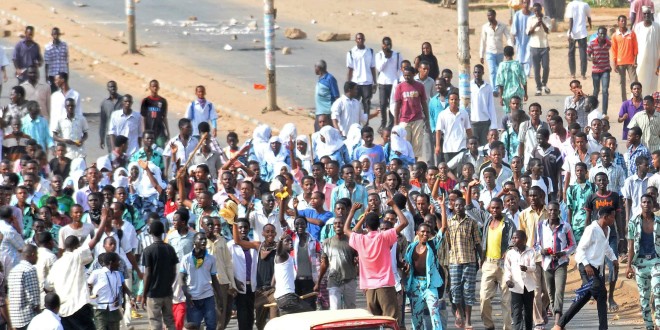58th ORDINARY SESSION OF THE AFRICAN COMMISSION ON HUMAN AND PEOPLES’ RIGHTS
Banjul, The Gambia, 4 – 20 April 2016
Oral Statement submitted under Item 8: Activity report of the Chairperson of the Working Group on the Death Penalty and Extrajudicial, Summary, or Arbitrary Killings in Africa
Madame Chairperson, distinguished Commissioners, State Delegates, representatives of National Human Rights Institutions and NGOs; all protocols respectfully observed.
The Cairo Institute for Human Rights Studies (CIHRS), the International Federation for Human Rights (FIDH) and its member organisation in Sudan, the African Centre for Justice and Peace Studies (ACJPS) note with deep concern the on-going excessive and lethal force used by Sudanese police and security services to disperse protests and other public gatherings.
On 10 January 2016, at least seven people, including one child, were killed when security forces opened live ammunition at a crowd of protestors outside the West Darfur state governor’s office. The crowd had gathered to demand protection after the nearby village of Mouli was looted and burned to the ground. The following day, three people were killed and seven others sustained gunshot wounds when security forces again fired live ammunition at the funeral for the deceased.
To date, there has been no accountability for the victims of anti-austerity protests that took place in 2013, when Sudanese security forces fired live ammunition to disperse protestors. Although our organisations documented that at least 185 people were killed, many the result of gun-shot wounds to the chest or head, Sudanese authorities have acknowledged just 85 deaths. The mandate, composition and findings of three commissions of inquiry reportedly established by authorities to investigate the killings have never been made public. Out of at least 85 criminal complaints pursued by victims’ families, only one progressed to court. The murder conviction of the accused, a Sudan Armed Forces officer, was overturned on appeal.
Human rights defenders and victims rights groups calling for justice and accountability for the 2013 protest killings have been subjected to arbitrary arrests and harassment. On 3 February 2016 a group of 15 women were arrested and beaten with wooden batons by members of Sudan’s National Intelligence and Security Service (NISS) in Khartoum for staging a protest demanding accountability for the 2013 protest killings. The group included the mother of nineteen-year-old Hazza Eldin Jafar Hassan who died after sustaining a gunshot wound to his head during a protest in September 2013. She was beaten on the head during the arrest.
Our organisations also remain seriously concerned about the use of the death penalty in Sudan, and the lack of official statistics regarding death penalty sentencing and executions. The death penalty in Sudan is implemented by hanging, including for a number of acts that don’t meet the threshold of “most serious crime”, in conflict with Sudan’s international commitments. Death penalty cases frequently raise fair trial concerns. ACJPS has documented political opponents facing the death penalty on baseless charges, as well as individuals sentenced to death on discriminatory grounds including because of their religious belief.
We recall the Commission’s Resolution 281 of 2014 on the Right to Peaceful Demonstrations calling on states to refrain from disproportionate use of force against demonstrators and to adhere to international standards on the use of force and firearms by law enforcement officials. We recommend that the African Commission advises Sudan to:
- Halt the violent suppression of protests and demonstrations and fully guarantee the rights to freedom of expression, association and assembly;
- Ensure that all allegations of unlawful killings and torture are promptly and effectively investigated by an independent and impartial authority and that perpetrators are held to account. The findings of inquiries into the killing of at least 185 protestors in 2013 should be published and the perpetrators held to account;
- Amend all laws that permit impunity for torture and extrajudicial killings in line with the African Charter on Human and Peoples’ Rights;
- Impose an immediate moratorium on executions, commute all death sentences and reduce the number of crimes punishable by death with a view to total abolition of the death penalty.
I thank you.
 African Centre for Justice and Peace Studies ACJPS | المركز الافريقي لدراسات العدالة و السلام
African Centre for Justice and Peace Studies ACJPS | المركز الافريقي لدراسات العدالة و السلام




